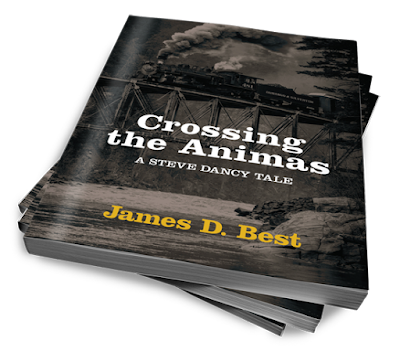 |
| No Peace, A Steve Dancy Tale |
Available in paperback (6X9 Trade Paperback) and for Kindles.
Excerpt
“Stay
put. You’re not leaving until I see my wife. Bring her to the door.”
“Hell,
she’s fine. I was just trying to rattle you. You know how it is.”
“No,
I don’t know how it is. That’s why I want to see her.”
“Which
one’s your wife?” he asked tentatively.
“The
older one,” I answered automatically, thinking only of Virginia and Jenny.
He
laughed. “That old hag. I thought she might be your mother. Hell, she’s right
as rain.”
I
flipped my rifle up, grabbed the end of the barrel, and rammed the butt as hard
as I could into the man’s face. I hit him square on the bridge of his nose, and
I heard the cartilage crushed into his skull. I pulled back to hit him again,
when I noticed the other men were going for their guns. Damn it. I dropped the
rifle and went for my pistol, hitting the wall with my shoulder to get behind
the collapsing man I had just hit. The first shot rang out from the next man on
my side of the hall. I grabbed the lapels of the man I had bludgeoned and tried
to pull him in front of me. I saw other muzzle flashes, one from my side of the
hall and two from the men on Sharp’s side. I jerked my human shield away from
the wall and extended my arm behind his head, firing at the second man on my
side. I shot him three times before I shifted my attention to the other men.
Both remained standing but writhed in pain. I shot them both again.
If
the outdoor shooting had been noisy and hazy, the confines of the hallway made this
fight ten times worse. If Virginia opened the door to see what was happening, I
would never see her through the gun smoke. My ears rang, my eyes stung, and my
throat felt raspy. The battle seemed like it had lasted for at least ten
minutes, but I knew that was an illusion. The fight had lasted under five
seconds.
I
glanced behind me and felt relief to see Sharp still standing. I surveyed our
assailants. None were dead yet, but three of them would die soon. I still held
up the man I had clubbed. His bloody face appeared lifeless. Then I felt my
shirtfront getting wet. Had I been shot? I let go of the body, and it fell to
the floor. My entire front was soaked in blood. I ran my hand over my stomach
and felt a wound. I probed a hole in my shirt with my finger and could feel a
bullet just inside my skin. That didn’t make sense. Then I reexamined the man
on the floor. He had been shot at least twice. I kicked him over with my foot.
One exit wound. Damn. The bullet had spent its energy passing through his body,
or at least most of its energy. I began to feel pain in my stomach.
Someone put his hand on my shoulder and turned
me around. Out of fear or shock, I almost fired my Colt but recognized Sharp at
the last moment. I wasn’t reacting right. What was happening? My stomach hurt
like hell, and Sharp’s mouth was moving, but I couldn’t hear what he was
saying. I felt wobbly. Is this what it was like to get shot? I didn’t know. I
didn’t know because I always won my gunfights.
My
legs felt weak, and I knew Sharp was holding me up. I was passing out.
 |
| Honest Westerns. Filled with dishonest characters. |






 Anyway, if you've read all six books in the series, consider Deluge to fill the time until No Peace hits the bookshelves.
Anyway, if you've read all six books in the series, consider Deluge to fill the time until No Peace hits the bookshelves. 





.jpg)
.jpg)